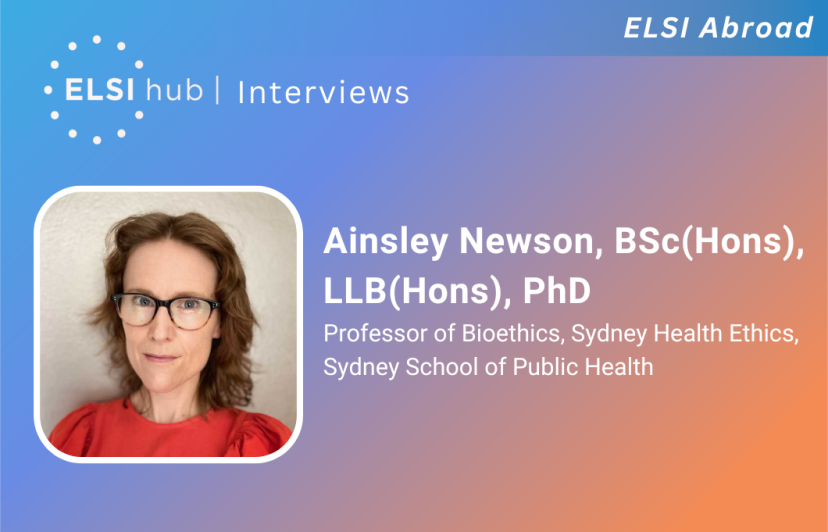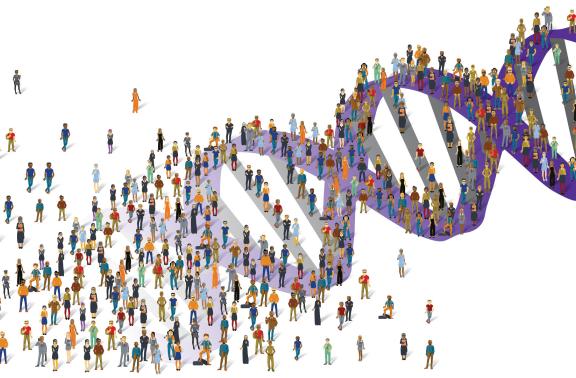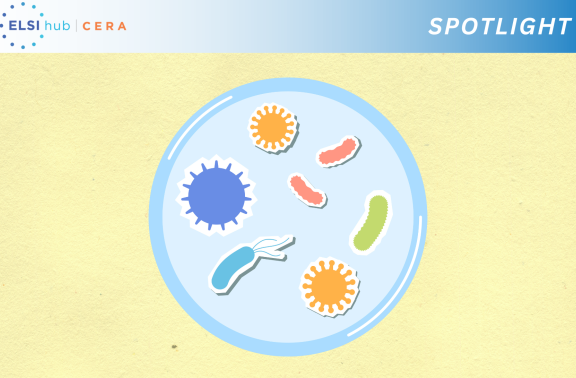
ELSI Abroad: Spotlight on Australia
Across the globe, ELSI studies continue to respond to the undeniable impacts of genetics and genomics on society and address both persistant and emerging issues. We hope that a global perspective on the ELSI project will inspire collaborative solutions to mutual concerns and highlight important contextual differences. This third installment of our global interview series looks at ELSI research in Australia with our guide, Ainsley Newson, BSc(Hons), LLB(Hons), Ph.D.
Dr. Newson is a Professor of Bioethics at Sydney Health Ethics in the Sydney School of Public Health, Faculty of Medicine and Health, at the University of Sydney. She has taught bioethics to students from an array of disciplines, including medicine and law, for over 25 years, and has coordinated bioethics degree programs in both Australia and the United Kingdom. Her current research focuses on the ethics of prenatal diagnosis, population screening, genomic data sharing, and mitochondrial donation (on which she has conducted an award winning citizens’ jury). She is a board member of the International Association of Bioethics, and a member of the Australian Health Ethics Committee. Dr. Newson has also founded and chairs the Australian ELSI Genomics Network, supported by Australian Genomics.
CERA: What inspired you to focus your work on the ethical, legal, and social implications of genetics and genomics? What are you working on right now
Dr. Newson: I have been fascinated with genetics since I was in high school. While I loved the detail of the science, I was much more interested in the bigger-picture implications, especially how genetic testing played out in families. At some point, I worked out that bioethics was a thing, and from my first year of university I was seeking out courses that involved ethics and science and looking at options for further study. Right through my undergrad degree in science and law at the University of Melbourne, I did every subject I could that involved ethical, legal, or social implications of genetics. This eventually led to a Ph.D. in this area.
Fast-forward nearly 30 years (gah!) and I’m still working on ELSI in (now) genomics. My current projects include leading a big consortium to develop a novel ethical governance framework for genomic data (the LINEAGE Study), leading a team to consider the pressures that genomic testing brings to reproductive autonomy (TARGeT), and being part of a team considering the ethical implications of bringing genomics into newborn screening (Genomics 4 Newborns). I have also recently worked on ethics and reproductive genetic carrier screening, and was the bioethics lead within Australian Genomics.
CERA: What can you tell us about ELSI research in Australia?
Dr. Newson: ELSI research in Australia is a comparably small, but very active research community. I think we do interesting and high-quality research. One thing I really like about our community here is that researchers—perhaps consistent with Australians being a friendly and easy-going bunch—tend to collaborate well and effectively. We leave our disciplinary baggage at the door and are curious about how each other asks and answers questions. There are ELSI researchers here based in bioethics, law, social science, psychology—the list goes on. We are also global leaders in deliberative public engagement. ELSI researchers here get their funding from all over the place, and we work either in stand-alone ELSI focused projects or as part of bigger science-/clinical-led initiatives that have an ELSI component.
CERA: What would you say is the most important ELSI issue in Australia right now? Why do you think this is so?
Dr. Newson: Picking THE most important ELSI issue in Australia right now is hard. There is super-interesting work happening across a lot of topics, including insurance discrimination, screening healthy adults, the use of genomics in newborn screening, the expansion of non-invasive prenatal testing, how to build and use large genomic datasets, whether to return raw genomic data, disability discrimination, including patient voices, and ensuring equitable care for all, among other projects.
But even though there is a lot happening, I believe the most important ELSI issue in Australia is the amazing work that is happening regarding the appropriate delivery of genomic health care for Aboriginal and Torres Strait Islander peoples. There is so much activity happening in this space (see the ALIGN Network for more), and I think many of the concepts, such as caring for community rather than individuals, leaving no-one behind, and recognising data sovereignty can help us improve the implementation of genomics for all.
CERA: What ELSI issues do you see that would benefit from multi-country deliberation by ELSI scholars?
Dr. Newson: I can’t think of an ELSI issue that wouldn’t benefit from multi-country deliberation by ELSI scholars. To me there is a lot to be learned and gained from comparing how ELSI play out in different settings. What might be a huge issue here might be irrelevant somewhere else, or we may learn about universal challenges. Having scholars from different countries come together can help us see where our reasoning or assumptions are clouded by our privilege, cultural backgrounds, or methodological confines.
Australian ELSI scholars are definitely keen to collaborate internationally and I’d say most already do in various ways. While our timezone can lead to some brutal early starts and late finishes, web conferencing platforms and other pandemic-related innovations really have brought our world closer together. I love collaborating and learning from my international colleagues.
CERA: What three works of ELSI scholarship from Australia would you recommend to the global ELSI community?
Dr. Newson: This is like asking me to pick my favourite child . . . there is so much to choose from. I am going to cheat a bit and offer three bodies of work.
- Australia has been a leader in the development and demonstration of feasibility of rapid genomic testing for critically unwell infants in the neonatal intensive care setting. Alongside the development of this amazing technology, ELSI aspects have been carefully considered. I’ve compiled the list below to give you a flavor of the literature.
- A recently-completed project in Australia has made a very passionate and well-reasoned case for better regulation to prevent genetic discrimination in risk-rated insurance products. The final report for this project contains links to relevant papers.
- The Australian Reproductive Genetic Carrier Screening Project (“Mackenzie’s Mission”) is a project I was involved with, but I’m really proud of it. It also offers an example of Australian innovation and international leadership in genomics. A large-scale trial of population-level reproductive genetic carrier screening has recently finished. An ethics arm was embedded in the project and this allowed us to see ethical issues arising in real-time and orient our research in a very practical way. You can read our outputs, which are listed below.
CERA: Can you think of any online seminars, scholarly resources, or anything else that you would like us to share with the broader ELSI research community?
Dr. Newson: The Australian ELSI Genomics Network hosts quarterly seminars online. These are recorded and made available via the Australian Genomics YouTube channel.
Sydney Health Ethics also puts out the SHE Research Podcast, which includes several episodes to do with genetics. Another Australian podcast worth a listen is Learn Me Right in Health Law and Bioethics, hosted by the Australian Centre for Health Law Research at Queensland University of Technology.
CERA: Is there anything else you would like to say?
Dr. Newson: Thanks so much for the opportunity to talk about ELSI genomics in Australia! I’ll be at ELSIcon in June 2024 and am really looking forward to seeing others there. In the meantime, I’m happy to connect via LinkedIn or X/Twitter.
If you would like to be interviewed for a future installment of ELSI Abroad, please feel welcome to email us at [email protected]. Please also see our other interviews in this series focused on ELSI research in Canada, the United Kingdom, and Belgium.
Australian ELSI papers Relating to Rapid Genomic Testing in Neonatal Intensive Care
Compiled by Prof. Ainsley Newson, March 2024
- Arkell, K., Gyngell, C., Stark, Z., & Vears, D. F. (2023). Rapid genomic testing in intensive care: Health professionals’ perspectives on ethical challenges. Children, 10(5), 824.
- Bowman-Smart, H., Vears, D. F., Brett, G. R., Martyn, M., Stark, Z., & Gyngell, C. (2022). ‘Diagnostic shock’: The impact of results from ULTRARAPID genomic sequencing of critically unwell children on aspects of family functioning. European Journal of Human Genetics, 30(9), 1036–1043.
- Gyngell, C., Lynch, F., Stark, Z., & Vears, D. (2021). Consent for rapid genomic sequencing for critically ill children: Legal and ethical issues. Monash Bioethics Review, 39(S1), 117–129.
- Gyngell, C., Newson, A. J., Wilkinson, D., Stark, Z., & Savulescu, J. (2019). Rapid challenges: Ethics and genomic neonatal intensive care. Pediatrics, 143(Supplement 1).
- Koplin, J. J., Gyngell, C., Savulescu, J., & Vears, D. F. (2022). Moving from ‘fully’ to ‘appropriately’ informed consent in Genomics: The PROMICE framework. Bioethics, 36(6), 655–665.
- Lynch, F., Prentice, T., Gillam, L., Stark, Z., & Gyngell, C. (2022). Rapid genome sequencing: Consent for new technologies in the Neonatal Intensive Care Context. Pediatrics, 150(6).
- Poogoda, S., Lynch, F., Stark, Z., Wilkinson, D., Savulescu, J., Vears, D., & Gyngell, C. (2023). Intensive Care Clinicians’ perspectives on ethical challenges raised by rapid genomic testing in critically ill infants. Children, 10(6), 970.
- Wilkinson, D. J., Barnett, C., Savulescu, J., & Newson, A. J. (2016). Genomic intensive care: Should we perform genome testing in critically ill newborns? Archives of Disease in Childhood - Fetal and Neonatal Edition, 101(2).
Publications from the Australian Reproductive Genetic Carrier Screening Project (“Mackenzie’s Mission”) Relating to Bioethics
Project contacts: Prof. Ainsley Newson: [email protected]; Dr. Lisa Dive: [email protected]
Papers marked with an asterisk (*) are available open access, with thanks to the University of Sydney’s membership of the Council of Australian University Libraries.
- Dive, L., Holmes, I., & Newson, A. J. (2023). Is it just for a screening program to give people all the information they want? The American Journal of Bioethics, 23(7), 34–42.
- *Dive, L., Archibald, A. D., Freeman, L., & Newson, A. J. (2023). How should severity be understood in the context of reproductive genetic carrier screening? Bioethics, 37, 359–366.
- *Dive, L., & Newson, A. J. (2022). Ethically robust reproductive genetic carrier screening needs to measure outcomes that matter to patients. European Journal of Human Genetics, 30(7), 754–755.
- *Newson, A. J., Dive, L., Cini, J., Hurley, E., & Farrar, M. A. (2022). Ethical aspects of the changing landscape for spinal muscular atrophy management in Australia. Australian Journal of General Practice, 51(3), 131–135.
- Newson, A. J., & Dive, L. (2022). Taking seriousness seriously in genomic health. European Journal of Human Genetics, 30(2), 140–141.
- *Dive, L., Archibald, A. D., & Newson, A. J. (2022). Ethical considerations in gene selection for reproductive carrier screening. Human Genetics, 141(5), 1003–1012.
- *Dive, L., & Newson, A. J. (2022). Reproductive carrier screening: Responding to the eugenics critique. Journal of Medical Ethics, 48(12), 1060–1067.
- *Dive, L., & Newson, A. J. (2021). Ethics of reproductive genetic carrier screening: From the clinic to the population. Public Health Ethics, 14(2), 202–217.
- *Dive, L., & Newson, A. J. (2021). Ethical issues in reproductive genetic carrier screening. The Medical Journal of Australia, 214(4), 165–167.e1.
Podcasts
Sydney Health Ethics, (Host). (2020–present). SHE Research Podcast. [Audio podcast]. Spotify for Podcasters. https://podcasters.spotify.com/pod/show/shepod
Australian Centre for Health Law, (Host). (2022–present). Learn Me Right in Health Law and Bioethics. [Audio podcast]. Queensland University of Technology. https://research.qut.edu.au/achlr/media/#podcasts


